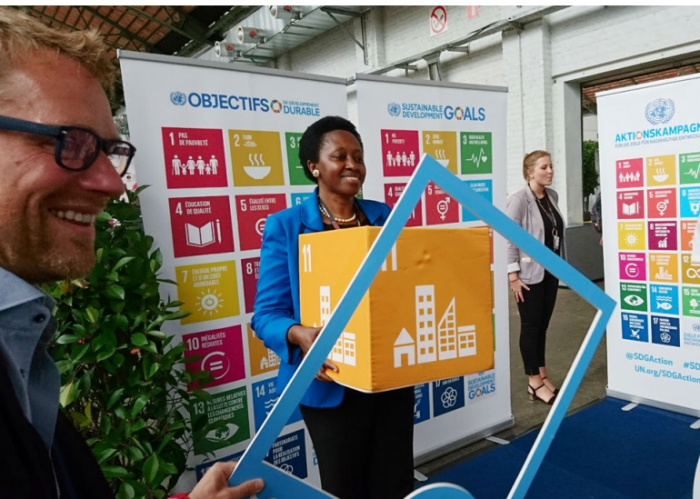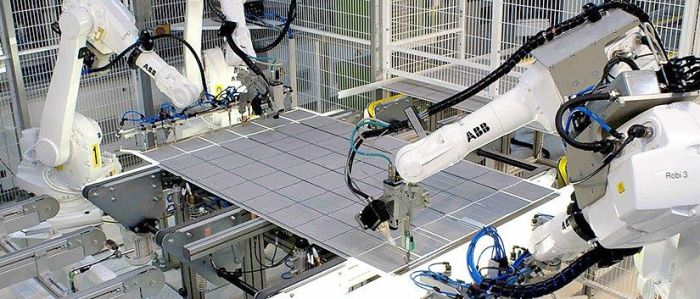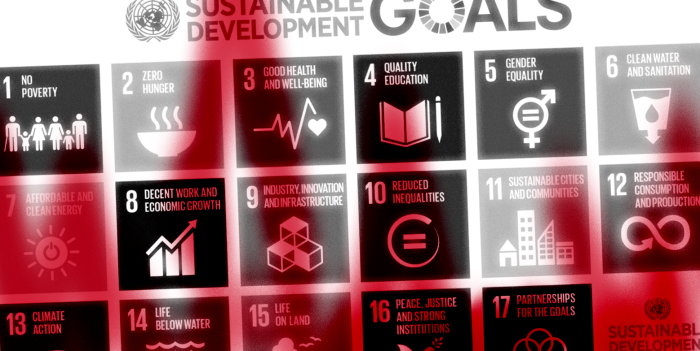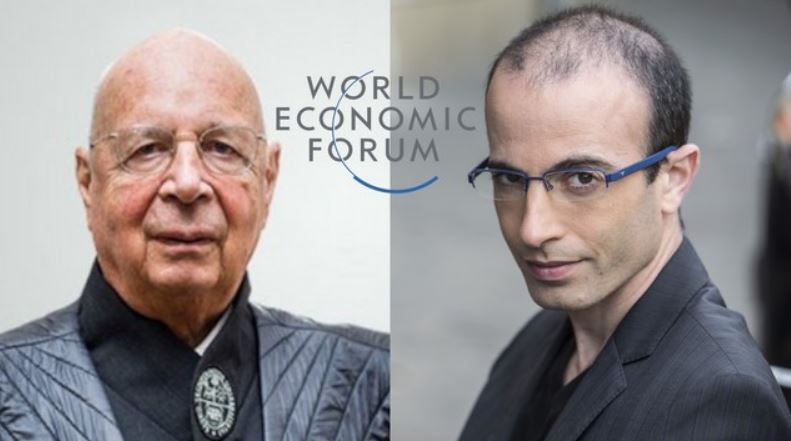SOURCE: WINTER OAK
by Paul Cudenec
I was delighted to be able to travel back to England for the first time in three years and take part in the March 25 conference held in London by the Real Left, at which I was on a panel presenting “the ecological case against the WEF”. This is the text of my talk, delivered to around 100 people.
The ecological case against the WEF is, for me, simply that this organisation represents everything that real ecologists oppose.
Its apparent interest in the environment exists solely in the realm of what it likes to call its “narrative” – its boss Klaus Schwab even published a book last year entitled The Great Narrative.
The real meaning of this term, in plain English, is lies. Whopping great lies. The WEF and their friends in what is sometimes called the Global Public Private Partnership know that we don’t want what they have in store for us, so they need to lie to us about what they are doing, and why they are doing it, so as to fool us into going along with it all.
Their general aim, across the whole spectrum of their current agenda – under all its various names – is to push us through into a new phase of central capitalist control with the active support of the left. This is why this conference is so important. We have to break that support.
By dressing up their insidious fascistic programme as a good and worthy thing, they hope to occupy the moral high ground often associated with the left and from that lofty position to be able to sneer down on their opponents as being selfish, backwards-thinking right-wingers.
We saw this with Covid, of course, and now with 15 minute cities and so on and I think the same trick lies behind the whole “woke” agenda, which is why so many instinctively sense its underlying hypocrisy.

What we are talking about is the continuation, ad absurdum, of the very old lie of using the terms “progress” and “progressive” to describe the expansion of the industrial capitalist cancer.
The language and general tone of the left is weaponised against the very values that the left is historically supposed to defend – freedom from central control and from exploitation, a strong sense of community, a way of living based on the self-fulfilment of the many rather than the self-enrichment of the few.
In the environmental realm, this deceit is not difficult to identify. After all, at the same time as championing so-called sustainable development, the WEF defines its overall mission as “laying the groundwork necessary for stakeholder capitalism to thrive”. [1]
When we consider that the WEF’s partners include the likes of Coca-Cola, Nestlé, Procter and Gamble, Google, Bayer, Unilever, Volvo, Volkswagen, Lockheed Martin, Boeing, BP, ExxonMobil, Shell, Rio Tinto and Heathrow Airport… we can have a fairly good guess at the actual importance it places on protecting the natural world. [2]
We hear a lot of talk about “renewable” technology from the WEF and its friends but as many critics are now pointing out, this is not at all what it claims to be. It is just another form of greenwashing.
Electric cars, for instance, don’t stop pollution, but merely displace it elsewhere, not just to the power stations that generate the electricity but to the mines which provide the lithium and cobalt for their batteries.
The manufacturing, transport and disposal of the tools of “renewable” energy, such as wind turbines and solar panels, involves hideous levels of environmental damage, not to speak of human suffering, as well as large quantities of the fossil fuels they are supposed to be replacing, but never really can.

Klaus Schwab’s inspiring “environmental” vision, as revealed in his books, includes installing giant mirrors in the stratosphere to deflect the sun’s rays, chemically seeding the atmosphere to increase rainfall and fighting climate change with the deployment of nanoparticles. [3]
For him, “clean” energy includes nuclear fusion [4] and he looks forward to the day when satellites will “blanket the planet with communications pathways”. [5]
Schwab also very much regrets all that red tape preventing the unhindered onward march of genetically modified food, warning that global food security will only be achieved by loosening regulations on GM produce. [6]
Ultimately it’s all just another way of making money. Schwab dreams of “profitable carbon-capture and use-production facilities” and of turning carbon dioxide from a greenhouse pollutant into an asset. [7]
The WEF’s actual stance on ecology is also, of course, confirmed by the very fact that it is expicitly promotes the so-called Fourth Industrial Revolution – Schwab wrote two books on the subject.
The promotion of transhumanism and the construction of an all-inclusive virtual “metaverse” in which our lives are digitally reproduced, is in itself the oppposite of a “green” approach – just think of the electricity needed to power this matrix and the raw materials required to construct it.

But, it’s even worse than that. The agenda being pushed by the WEF, and the wider global financial system which it represents, aims not to protect nature, but to commodify it, to use it as a new market into which its economy can expand, to turn it into yet another source of financial speculation and profit.
The WEF supports the so-called New Deal for Nature, otherwise known as NaturePositive or 30×30, whose apparent aim of “protecting & restoring nature”, amounts to nothing less than a trillion-dollar land grab, particularly in Africa. I’d recommend people look up the No Deal For Nature campaign to learn more about that.
Another aspect of this commodification can be seen in Environmental Impact Bonds, part of the broader impact capitalism publicly launched by venture capitalist Sir Ronald Cohen, a friend of Tony Blair and Gordon Brown.
This scam takes advantage of the lack of funds available to cash-strapped debt-ridden governments to advance yet further the profitable privatisation of roles traditionally played by the public sector.
The approach has been described as the “monetization of future cost savings”. [8]
In the case of Environmental Impact Bonds, investors hope to earn substantial returns on their money by financing so-called “solutions” to environmental problems on an outcome-based “pay-for-success” model.

Whether or not these “solutions” are really helpful in the long-term is not so important – if they can tick the “outcome achieved” box and grab the cash, who cares that the hundreds of trees that were planted all wither and die in the summer heat because nobody came to water them?
Environmental success, in this very narrow context, can even be defined as helping businesses to find cheaper ways of complying with government regulations or of side-stepping them in some legal but ethically dubious way. [9]
The real point of these “conservation finance opportunities”, their raison d’être from the point of view of an impact capitalist, is that they “make economic sense”. [10]
That’s to say that they make money and can prove highly lucrative, especially as the bonds can be traded.
Not just the success but also the failure of these environmental “solutions” therefore has considerable potential value for a skilled speculator.
In general, the very term “sustainable development”, as championed by the WEF, is a deliberately misleading one. It’s not the natural world which is intended to be sustained, but the development that is destroying it.
This term is of course the basis of the UNSDGs, which the WEF officially promotes, and which provide the thematic structure for the whole range of impact investing.
“Sustainable development” represents the continuation and acceleration of the development agenda that has long been promoted by the UN, along with sister bodies like the World Bank and the Commonwealth.
Even the term “development” very much forms part of the deceptive narrative that I described earlier. It carries the implication of being something benign, even good, something inevitable and bound up with the necessary onwards march of “progress”.
But behind this is a deliberate programme aimed at forcing through the expansion of the capitalist system and thus the wealth and power of those at the top of the pyramid.
The UN’s first official “Development Decade” was the 1960s and by 1986 it was publishing its Declaration on the Right to Development with its absurd statement that “the right to development is an inalienable human right” (another example of the way it hijacks the political language of the left to serve its own capitalist agenda).
It said its aim was to bring about “a new international economic order” and insisted that “States have the duty to co-operate with each other in ensuring development and eliminating obstacles to development”.

The UN and associated organisations are the “public” part of the Global Public Private Partnership, providing the legal infrastructure by means of which their private sector partners can profit, at the expense of humanity and nature.
If we picture industrial capital as a locomotive, belching smoke and steam as it thunders endlessly on towards still greater “prosperity”, we would see this global administrative infrastructure as the rails on which it travels.
The rails, the perceived “need” for ongoing development, the in-built presumption that society must organise itself in the interests of the growth of capital, only exist to carry the locomotive.
And the locomotive would not be able to get where it wants to go if the rails had not been laid down for it, and all obstacles to its advance duly eliminated, this being in truth not so much a public-private “partnership” as the complete hijacking of the public realm for private interests.
The locomotive of capital is not “sustainable”, “environmentally friendly” or “green”.
It is a process of dispossession, despoliation and destruction in the narrow self-interest of its sociopathic owners.
It feeds off the flesh of nature, sucks up life and spews out death.
Painting it green and draping its infernal machineries with rainbow-coloured bunting changes nothing.

[1] https://www.weforum.org/topics/economic-growth-and-social-inclusion/
[2] https://www.weforum.org/partners/
[3] Klaus Schwab, Shaping the Future of the Fourth Industrial Revolution: A Guide to Building a Better World (Geneva: WEF, 2018), e-book, 72%
[4] Ibid. 69%
[5] Ibid. 75%
[6] Ibid. 56%
[7] Klaus Schwab, The Fourth Industrial Revolution (Geneva: WEF, 2016), e-book, 39%
[8] https://sites.duke.edu/casei3/files/2013/03/CASEi3_EIB_Report_FINAL-links.pdf
[9] https://iopscience.iop.org/article/10.1088/2634-4505/ac0b2c
[10] Ibid
